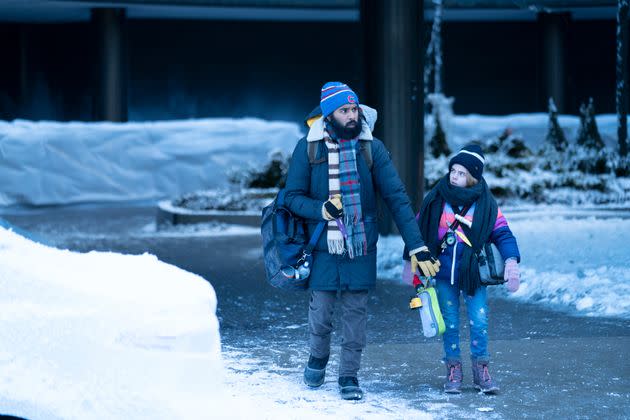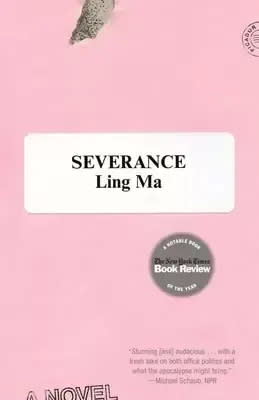If You Liked 'Station Eleven,' Here's What To Watch And Read Next

For the past two weeks, I’ve been raving about the new HBO Max miniseries “Station Eleven” in conversations with friends, family and anyone who’s mentioned wanting a new TV show recommendation.
More often than not, I face some skepticism: “Uhh, isn’t that the show about a pandemic?”
And yes, I get the doubt. Many of us watch TV to escape the grim realities of our COVID-filled present. The source material for the show is Emily St. John Mandel’s 2014 novel of the same name, an eerily prescient story about a “Georgia flu” pandemic that kills millions, collapsing governments and societies in a few short days, and what happens to a band of survivors 20 years later. I have COVID fatigue from following the latest omicron updates, and I don’t think I could bear watching the show if it were actually about society confronting an indefinite coronavirus pandemic.
That hits too close to home.
But “Station Eleven” the TV show, which I enjoyed even more than the book, does not center on the whys and hows of the pandemic. Starvation would be my constant worry in the end times, but the characters living in this “post-pan” world get by foraging mushrooms and hunting deer. The group of theater actors and musicians on which the show is focused is more concerned with making art and debating who should play the title role in “Hamlet.” The motto on the makeshift carriage they use to travel throughout post-pan Michigan is “Survival is insufficient.”
Pandemic or apocalyptic shows can be hopeful and appealing, even during this actual pandemic.
It may seem counterintuitive to watch something in the pandemic and apocalypse genre when so many of us are already feeling traumatized by our own ongoing pandemic. But “Station Eleven” is emotionally affirming and even comforting: The series makes the case that the bonds you forge with others will literally and figuratively save your life, more so than wealth and network connections ever will. It’s the only pandemic content in recent memory I can recall wanting to rewatch.
At the beginning of the show, Jeevan Chaudhary, played wonderfully by Himesh Patel, is thrust into the unwanted role of a caretaker to a young actor named Kirsten (Matilda Lawler) he encounters on the day the plague overwhelms society. Jeevan is a blogger who doesn’t really have a job and owes his sister $18,000, but he’s willing to rush onto stage to see if an actor having a heart attack is OK even though he is not a doctor. Jeevan is a helper, whether he knows how to be one yet or not. It’s not a job he will ever be paid for, but it’s a profession that keeps him going during the crisis to come.
Jeevan decides to walk Kirsten home after seeing that she’s alone after her play, and that changes everything. This is the most genius alteration from the book, in which Jeevan and Kirsten have their own storylines but never meet. In the TV adaptation, their rocky bond, which covers the push-pull of an anxious adult trying to keep a child safe and a young child needing creativity and independence, is the heart of the show.
If pandemic shows appeal to you, too, you might be like me: someone who takes comfort in realizing we aren’t alone during these seemingly unsurmountable challenges. This is a common psychological response to watching these kind of intense, traumatically familiar shows. No major spoilers, but in the final episode of “Station Eleven,” there is a wordless reunion between two characters who thought they would never see each other again, and their love was so satisfying to watch that I hugged myself while tearing up.
I have watched and enjoyed countless plague horror stories –- including the films “Night of the Living Dead” and “28 Days Later” and the book “World War Z” ― but I would not describe these stories as tender. “Station Eleven” is, however, a tender story about individuals learning that stabbing people is not the answer, as moody adult Kirsten puts it.
The threat of violence is omnipresent in their lawless world, but the characters who live on 20 years after Day Zero want to entertain and make art as well as survive. Some of them hold on too hard to the past and set up an exhibit filled with gaming consoles and ID cards, calling it a “museum of civilization.” Others hold on too tightly to the present and believe “there is no before.” Those who appear the most whole are the ones who found someone in the present to share their hopes and anxieties with.
“Having just one person, just one other person, it’s a big deal,” post-pan Jeevan tells another character. Their efforts to survive may not change the outcome of a given situation, but being there for someone still matters.
Caring for another human being is hard, pandemic or not, but still worth it. That’s the kind of message I want to get behind. If you, too, are into pandemic apocalypse stories that are not directly about COVID-19 or surviving an apocalypse, here are some other books and shows to consume after “Station Eleven″:
1. “Severance” by Ling Ma

I love this satirical book from 2018 about what can keep people trapped in jobs and roles they hate. In “Severance,” when Shen Fever spreads throughout the world, people don’t become bloodthirsty zombies. They become victims who keep repeating a routine on loop forever. Those who somehow escape being infected, like the book’s unfulfilled millennial narrator, Candace Chen, are freed from the daily grind of work but are forced to reckon with how they actually want to spend their life.
The dark comedy is that, at first, Candace decides to just keep working at her office job in publishing in order to receive a big payoff that her superiors promise will come to her and their skeleton crew of employees.
“Everyone was keeping score,” Candace notes. “Like who would get to compile and send the weekly productivity reports to management, who arrived on time and who arrived late, who heeded corporate policy by wearing those hideous N95 masks, who was taking the initiative for restocking the coffee filters.”
Candace becomes the staff’s last holdout and sets up camp in an executive office, but it’s clear this is not a victory. I, for one, finished the book knowing that I didn’t want to be one of those office drones whose Shen Fever loop of my strongest routine was me typing at my desk, doing work.
2. “Kingdom” on Netflix
If you want an end-times story that focuses on how a government would respond to a society-altering event like a plague of zombies, watch “Kingdom.” I binged this Netflix TV series in 2020 when the word “pandemic” was beginning to be used in reference to COVID, and I was gripped from start to finish about the unsettling parallels between its world and ours.
Set in a 16th century Korean dynasty, “Kingdom” follows an outbreak that could be contained but for selfish authority figures who refuse to act in the best interests of the most vulnerable members of society. Our hero Crown Prince Lee Chang (Ju Ji-hoon) sets out to investigate reports of a mysterious illness and finds himself embroiled in a political conspiracy to silence the news of an undead pandemic. In Season 2, the virus mutates and forces Prince Chang, take-charge physician Seo-bi (Bae Doo-na) and the other zombie believers to adapt or face extinction.
Sound too familiar? What keeps the story from being more than just undead-on-living violence is watching the many attempts Seo-bi and her compatriots make to warn the public about the plague. One town’s officials decide it’s OK to burn dead peasants, per hard-learned wisdom about how the virus spreads, but they still want to bury dead nobles. By the end, people who want to survive learn to follow public health guidelines, whether they want to or not.
3. “Don’t Look Up” on Netflix
This end-of-the-world story just came out last month on Netflix. The movie stars Leonardo DiCaprio and Jennifer Lawrence as two astronomers trying to convince the U.S. president (Meryl Streep) and a skeptical public that a comet is going to strike Earth and wipe out civilization.
This recommendation, however, comes with caveats. The film is marketed as a satire, but the only time I laughed was when DiCaprio, playing scientist Dr. Randall Mindy, reaches his breaking point and blurts out “Every single man, woman and child is going to die” while filming a fictional Sesame Street-style show for kids. I found Cate Blanchett’s star power to be wasted playing the tired trope of yet another woman broadcaster who sleeps with her interview subjects. I was prepared to laugh at Jonah Hill playing a crass, status-hungry White House chief of staff who does not believe in the comet’s arrival, but I found myself bored. And I was not sold that during a global apocalypse the U.S. government would be humanity’s final, single chance at averting a comet strike.
And yet I was engrossed by the last few minutes of the film, when the odds of an Earth-killing comet striking the planet become increasingly apparent.
What you decide to do with those moments can reveal everything about who and what you value: Do you gossip about co-workers you hate for some sense of normalcy as pandemonium reigns outside the bar? Do you eat salmon with loved ones as your dinner table ominously rattles? It’s worth a watch, just so you can talk about wether you hated or loved the clear climate crisis allegory of people refusing to listen about what’s right in front of them.
4. “Children of Men,” available on Apple TV, Amazon Prime and more
This recommendation was released in 2006, but the film’s themes on xenophobia and finding hope in the face of overwhelming despair are unfortunately timeless.
The story, co-written and directed by Alfonso Cuarón, takes place in a world where, for some undisclosed reason, it’s been 18 years since the birth of a child, and no one can have children anymore. The population is facing extinction, and when our world-weary protagonist Theo Faron (Clive Owen) encounters a woman named Kee (Clare-Hope Ashitey), he discovers she has a secret that fills him with unfamiliar hope and purpose. He agrees to use his connections to help smuggle Kee out of dystopian Britain, where immigrants seeking refuge are rounded up in pens, and to get her to safety.
If you want an apocalypse story that refuses to give in to the despair of living through a horrible time, I recommend this. In a sequence I still think about, it ends with the sound of children’s laughter.
This article originally appeared on HuffPost and has been updated.

 Yahoo Movies
Yahoo Movies 


